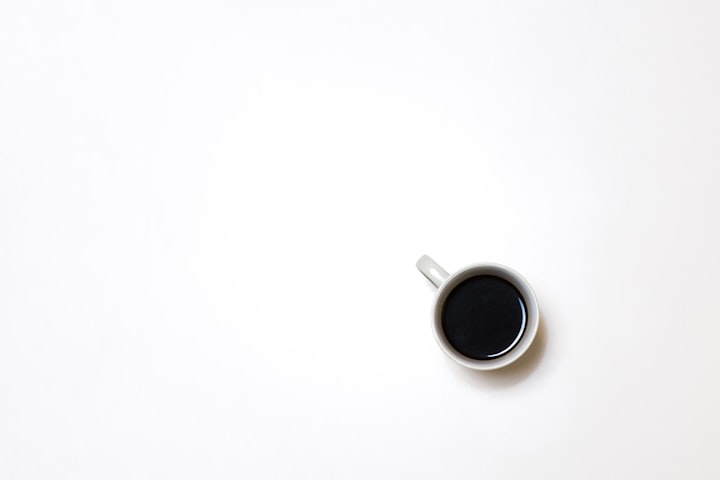Sugar, Cream, and Mental Illness
How much should you share on a first date?

I often joke that I've felt anxious since I became conscious. Though my childhood is foggy, the few moments I do remember are riddled with the symptoms of my lifelong OCD. Playtime, holidays, family vacations; all marred with obsessive thoughts and rigorous routines I created as a desperate attempt to regain some control over the anxiety I was assigned at birth.
Throughout my life, I've been through endless phases of obsession. From the fear of germs to extreme superstition and even total memory avoidance; my anxiety melded and warped as I grew. My OCD worsened when stress was high at home and significantly lessened when things were stable. This ebb and flow was both a blessing and a curse. It allowed for some brief relief from my more severe symptoms but it also made it much easier to hide my internal struggles from those around me. As a child this concealment stemmed from the embarrassment of being different but quickly morphed into a sort of backwards martyrdom as I grew. I had no reason to refuse help. My older sister also suffered with the disorder and had been professionally diagnosed, with the full support of my parents, at age twelve. I respected her for seeking help but couldn't seem to apply that respect to my own experience. Admittance to me felt like failure, a humiliating moment of weakness.
Despite my every effort things came to a head my sophomore year of high school. My eldest sister attempted suicide which resulted in severe brain damage, an incident that shook my family to the core. Stress remained high for months after the incident and my OCD became so severe that I could no longer hide my symptoms from those around me. I spent hours on end every day in an endless cycle of triggers and compulsions. I was forced to drop out of school and though I still refused to label my experience my parents knew exactly what was going on. From there it took almost two more years of spiraling before I finally found the courage to get help.
At the age of 18, I finally realized that my life was not going to progress until I got help. This realization caused me to pretty much drop off the face of the Earth for a little over four months. During this time I attended daily outpatient therapy, experimented with different anxiety medications, and tried my best to navigate the acknowledgement of my disorder. Though I was able to finally admit aloud that I was suffering from Obsessive Compulsive Disorder I had trouble deciding who needed to know and how to tell them. To me, OCD was like breathing. It was an experience I'd carried with me since birth. I wasn't going to announce it with a post on social media as if I'd gotten a new pet. In my mind that would be the same as if I were to tell people I had brown hair. Ultimately I decided that I owed an explanation to a handful of very close friends. These friends had always been extremely kind and patient with me. My diagnosis would finally give them an explanation for my bouts of irritability, irrational behavior, and any sudden disappearances. I received different responses from every person I told. Almost everyone was surprised. Some were angry and felt they'd been lied to. One was sad. Most were just curious and wanted to know more about my symptoms. I tried my best to take everything in stride but deep down I knew that this would become my new normal. OCD is incurable and can only be treated. With the help of my therapist, I had implemented exposure therapy into my everyday life and moving forward I was going to have to be a lot more transparent about my disorder.
The first time this “new normal” went into effect happened to be on a first date. I had met a pretty girl on a dating app and plucked up the courage to ask her out for coffee. She agreed and we met up at a little café, roughly twenty minutes from my home. We hit it off really well and before long had exhausted most topics of conversation. This led us to discuss our dating history and when she asked why I had never had a serious relationship before, I paused. I knew the answer. It was because my OCD had taken up pretty much all my time and attention, but was I ready to admit that to a complete stranger? I thought back to my friend's reactions and how many of them had felt lied to. I decided that in order to be fair I had to put my fear aside and be honest. I admitted to her that it was because I'd spent my young adult years trying to manage my OCD. After the words left my mouth I braced myself for her reaction. Would she think I was weird? Would she want to avoid someone with that sort of emotional baggage? Would she get up and leave? None of that happened, instead something totally unexpected did! She started opening up about her own mental health struggles. I sat and listened for as long as she wanted to share and I learned way more about her history and who she was as a person than I ever expected to on a first date. The thing I was so embarrassed to admit ended up being the very thing that laid a foundation of honesty and compassion in our relationship.
About the Creator
Mary Moody
Queer, intersectional feminist exploring my identity through art.






Comments
There are no comments for this story
Be the first to respond and start the conversation.